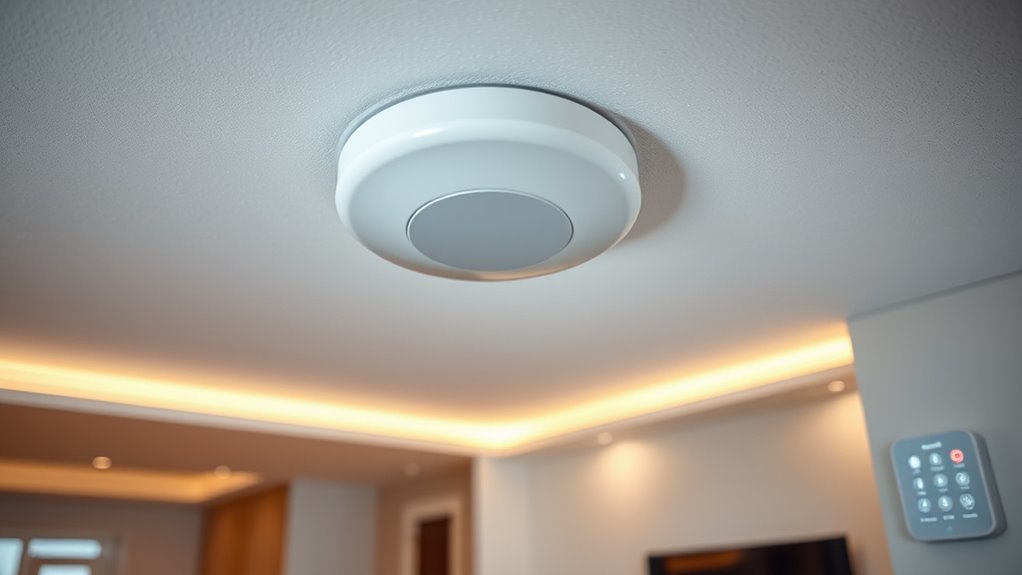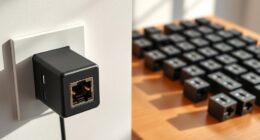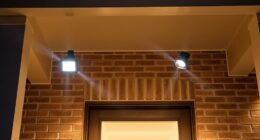Incorporating smoke alarms into your security plan is vital for early fire detection and quick response. Install interconnected detectors on every level, especially in sleeping areas and hallways, and keep them well-maintained with regular tests and battery changes. Use advanced smart alarms that connect to your home security system for remote alerts and automatic actions. Educate everyone on safety procedures and practice fire drills. Staying proactive on these measures will help you create a safer, more prepared space—discover how to optimize your plan further.
Key Takeaways
- Integrate smoke alarms on every level and sleeping areas to ensure early fire detection throughout the property.
- Use interconnected and smart smoke alarms for synchronized alerts and remote notifications via home security systems.
- Regularly test, maintain, and replace batteries to ensure reliable operation and quick response during emergencies.
- Educate occupants on alarm significance, safety procedures, and conduct fire drills to strengthen emergency preparedness.
- Combine smoke alarms with other security measures like sprinklers and automatic door locks for comprehensive fire safety coverage.

Including smoke alarms in your security plan is essential for ensuring safety and early detection of fires. These devices are a vital part of fire detection systems, providing immediate alerts that can prevent injuries, property damage, and even save lives. When you integrate smoke alarms into your overall security strategy, you strengthen your emergency preparedness, making sure you’re ready to respond swiftly in any crisis. Smoke alarms act as the first line of defense, giving you crucial time to evacuate or address a fire before it escalates. This proactive approach reduces the risk of panic and confusion during emergencies, allowing you to act calmly and decisively.
Including smoke alarms enhances safety and early fire detection for swift, calm responses.
To maximize their effectiveness, you need to place smoke alarms strategically throughout your home or business. Install them on every level, including the basement and attic, and particularly in sleeping areas and hallways. This guarantees that no matter where a fire starts, you’ll receive an early warning. Keep in mind that smoke alarms should be tested monthly to confirm they’re working properly. Regular maintenance, like replacing batteries at least once a year and cleaning dust or debris from the units, helps maintain their sensitivity and reliability. Combining smoke alarms with other fire detection systems, such as interconnected alarms, can improve safety by ensuring that when one alarm detects smoke, all alarms sound simultaneously, alerting everyone inside immediately.
Incorporating smoke alarms into your security plan isn’t just about installing devices; it’s about understanding their role in emergency preparedness. Educate everyone in your household or workplace about the importance of these alarms and what to do when they sound. Conduct fire drills regularly so that everyone knows escape routes and safety procedures. Knowing how to respond quickly to an alarm can make all the difference in an emergency situation. Additionally, consider integrating your smoke alarms with your home security system if possible, so that alerts can reach you remotely or trigger automatic responses like unlocking doors or activating sprinklers.
Advances in AI technology, such as smart smoke alarms that can differentiate between real fires and false alarms, further enhance safety and reduce nuisance alerts. Ultimately, smoke alarms provide peace of mind because they enhance your ability to detect fires early and respond effectively. When incorporated thoughtfully into your security plan, they serve as a critical safeguard, giving you more control during an unpredictable event. Remember, fire detection is a cornerstone of emergency preparedness, and having reliable smoke alarms is one of the simplest, most effective steps you can take to protect yourself, your loved ones, and your property. Staying vigilant and maintaining your alarms ensures that you’re prepared for the unexpected, reinforcing the safety of your entire living or working environment.
Frequently Asked Questions
How Often Should Smoke Alarms Be Tested and Replaced?
You should test your smoke alarms at least once a month to guarantee they’re working properly. Check the battery maintenance regularly and replace batteries at least once a year, or when the alarm chirps indicating low power. Replace the entire smoke alarm every 8-10 years, following the manufacturer’s replacement schedules. Doing this keeps your fire safety system reliable and helps protect your home and loved ones effectively.
Can Smoke Alarms Detect Carbon Monoxide or Other Gases?
A stitch in time saves nine, so you should know that smoke alarms don’t detect carbon monoxide or other gases. For gas detection, you need specialized CO detectors. Regular alarm maintenance guarantees all alarms work correctly and keeps your home safe. While smoke alarms alert you to fires, it’s wise to install separate CO detectors to monitor dangerous gases, providing thorough protection against multiple hazards in your home.
What’s the Best Placement Strategy for Smoke Alarms?
You should prioritize strategic placement considerations to maximize safety. Install smoke alarms on every level, including the basement and attic, and inside bedrooms and hallways. Maintain an adequate alarm density by placing alarms at least 10-15 feet apart. Avoid corners, drafts, or near vents, as these can cause false alarms. Regularly test alarms and replace batteries to guarantee they function correctly. Proper placement saves lives during emergencies.
How Do Smart Smoke Alarms Integrate With Security Systems?
Imagine peace of mind, knowing your safety is connected. Smart smoke alarms seamlessly integrate with your security system through wireless connectivity, allowing you to receive alerts on your phone or control devices remotely. They’re compatible with various smart home platforms, making setup effortless. This integration not only enhances safety but also creates a unified, intelligent security network that keeps you informed and protected, no matter where you are.
Are There Specific Certifications to Look for When Choosing Smoke Alarms?
You should look for smoke alarms with certification standards like UL or ETL, which guarantee they meet safety and quality ratings. These certifications indicate the alarms have been tested for reliability, durability, and proper functionality. When choosing, prioritize alarms with high quality ratings, as they provide better detection and fewer false alarms. Certified alarms give you peace of mind, knowing your safety devices are dependable and compliant with industry standards.
Conclusion
By integrating smoke alarms into your security plan, you’re not just protecting your home from fire; you’re safeguarding your future. These alarms symbolize vigilance and peace of mind, standing guard like silent sentinels. When you listen for their alert, you’re reminded that true security is about more than just locks—it’s about foresight and preparedness. Embrace them as symbols of safety, and let your home be a sanctuary where every alarm echoes your commitment to those you love.









